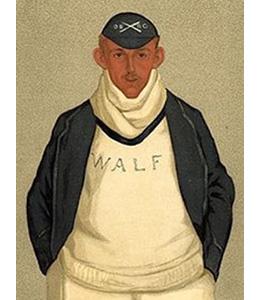Died of pneumonia after gas poisoning aged 50
Buried at All Hallows, Allerton, Liverpool, Lancashire, England
William Alfred Littledale was born in Allerton, Lancashire, the eldest son of Alfred and Edith Fletcher.
At that time his father was a cotton broker who, later, having inherited considerable wealth, held various directorships and was a J.P. and D.L. The family, with their eight children, lived at Allerton House which had been designed for a forbear in 1815. It continued in their ownership until destroyed by fire in 1944. William’s great-grandfather had been a buccaneering privateer.
William was educated at Cheam and Eton, where he first became an inmate of Mr. (later Dr.) Warre’s House, and afterwards sojourned with Mr. Wintle. But the river had more attraction for him than the Muses; and, although he had not been much of a boy in his early youth, he soon helped to win the Trial Eights, and went to Henley as No. 3 in the Eton Eight. When he was not pulling an oar he played football, and was 12th man at Oppidan Wall.
William came up to Christ Church in 1888 where he rowed to win the Ladies' Challenge Plate and the Thames Cup at Henley Royal Regatta in 1889. In 1890 he stroked the Oxford eight in the Boat Race to end a Cambridge run of four victories. He rowed in the 1891, 1892 and 1893 Boat Races. With Vivian Nickalls he won the Silver Goblets at Henley in 1892 and 1893 and both the Pairs and the Fours at Oxford. He rowed in winning Leander Club crews at Henley. His College presented him with a handsome salver as the benefactor of the Christ Church Boat Club. He was a member of the Oxford Water Polo team and was on the Committee of Vincent’s.
There are six feet and three inches of him, and he weighs within a few pounds of fourteen stone. His chest, back, and stomach are all muscle; yet his shoulders are inferior and his arms comparatively inferior. He has a ruddy face, which is even ruddier after a hard race when other men look pale. He is so ready for a “rag” that he is always ruffling somebody’s hair; and less frequently he gets his own ruffled. Yet is he not so ferocious a person as he pretends to be, for a child has been seen to play with him. He takes a very large size in boots, and he is so fond of dogs that he shares his Oxford lodgings, in Alfred Street, with several of them, as well as with bow and No. 5 of his Eight. He has just managed to struggle through the School of Political Economy, and he hopes by getting through two more easy Schools to achieve the degree which was, of course, his object when he went up to Oxford. He is a capital shot, a staunch friend, and a really good fellow, full of British pluck. His activity (perhaps) has earned for him the name of “Flea.”
“Flea” (Spy), 18 March, 1893
William matriculated in 1888 and became a rowing coach. He had learned a technique at Oxford of a combination of swing and slide, together with a lightning entry, and he taught it to Cambridge in 1898 and 1899 to create a magnificent Cambridge crew of 1900. He missed coaching for the 1901 Boat Race as he took part in the Second Anglo-Boer War where he was awarded the D.S.O. He reached the peak of his fame as a coach and afterwards coached many Oxford crews. He was also a big game hunter and explorer in Siberia, Kenya, and Tibet.
In World War I, William served as Captain of the 2/6th Rifle Battalion of the Liverpool Regiment. His troops suffered the second mustard gas attack of the war, at Armentières in July 1917, which wiped out two companies and incapacitated 440 men, including Fletcher himself. He was released from hospital two months later and resumed command, but never fully recovered and gave it up in July 1918. “Few beyond his intimate friends know what it cost him to ask to be relieved, not from any sense of personal pride,” wrote a fellow captain, “but from his intense love for his battalion.”
After the war, when he was acting chairman of the Henley Regatta, he put forward a motion to hold a scaled-down Henley Regatta in the following summer, which was carried unanimously. However he never saw it to fruition since he died in the 1918 flu pandemic from broncho-pneumonia which caught hold in his gas-weakened lungs
A bronze by G.D. Drinkwater stands in his memory in the O.U.B.C. boathouse, dedicated “by rowing men of both universities.”


